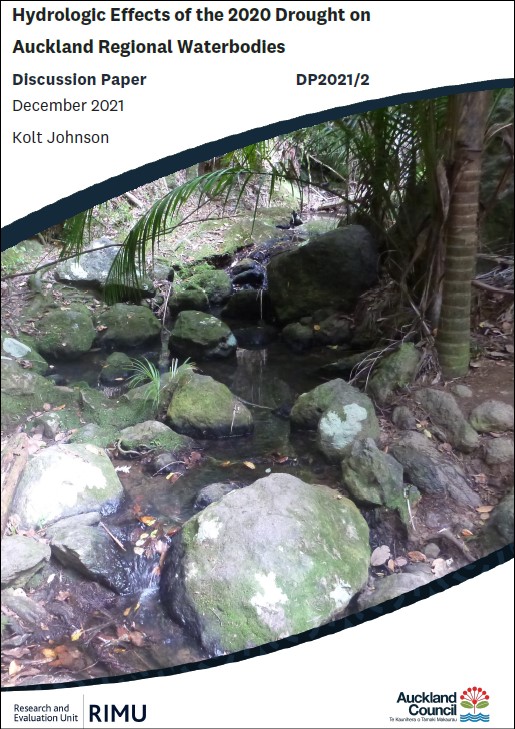Hydrologic effects of the 2020 drought on Auckland regional waterbodies
Author:
Kolt JohnsonSource:
Auckland Council Research and Evaluation Unit, RIMUPublication date:
2021Topics:
EnvironmentExecutive summary
This report describes the inventory and analysis of rainfall, soil moisture, river flow, lake water level, and groundwater level data for 2020, specifically to characterise the effects of the 2020 drought on the region’s rivers, lakes, and aquifers. Data spanning the 2020 drought were compared against long-term records to analyse the magnitude and duration of impacts on regional waterbodies.
The data indicate the summer of 2020 had one of the most severe droughts in the Auckland hydrological record. Multiple hydrometric datasets clearly show significant impacts from the 2020 drought. Regional average rainfall over the summer was 52% below the mean for the period 1980-2020. Record low soil moisture was recorded at most monitoring sites and low soil moisture conditions persisted from November to April for most sites. Thirteen of 23 river flow sites had the greatest number of days below MALF and nine sites had the lowest seven-day mean flow on record. Regional average low flows during the 2020 calendar year had 97 days below the mean annual low flow, the highest number of low flow days over the period of analysis from 1980 to 2020. The 2020 summer water level in Lake Rototoa was the lowest on record for all data since 1984. Lake water level at Pupuke was the third lowest on record for the period 2006-2020, but generally exhibited a hydrograph similar to 2014, which was not a drought year. Nine groundwater level monitoring sites recorded the lowest groundwater level on record and 20 other sites recorded the lowest groundwater level on record for that time of the year.
Groundwater pumping from the Parakai geothermal aquifer was stopped twice during Covid-19 lockdowns, which led to sharp increases in groundwater levels. These data demonstrate how groundwater levels are significantly affected by water use and that rules on groundwater allocation and operation have observable impacts on groundwater systems. The dynamic nature of Auckland’s groundwater systems is highlighted by these observations, which show that environmental outcomes can be affected by water management policies like allocation limits and temporary restrictions. This is evidence that a balance of competing values can be achieved through feedback between policy development, implementation, and monitoring.
Water use was not analysed for this report. Water use is a critical component of a complete analysis of hydrological data in the context of resource management, so the best application of these results will be alongside a subsequent analysis of water use data. This is particularly relevant to waterbodies that have a high proportion of water takes to the total availability. These water bodies are the most likely to be affected by water use and therefore the most likely to suffer ecological consequences from droughts, exacerbated by water use. This draws attention to the importance of communication of flow data to water users and the proactive management of water take activities during low flow conditions.
Auckland Council discussion paper, DP2021/2
December 2021
